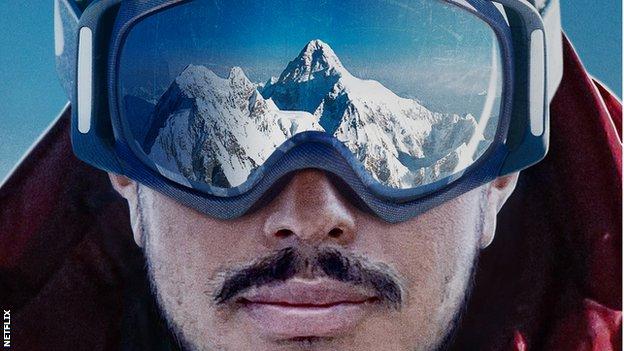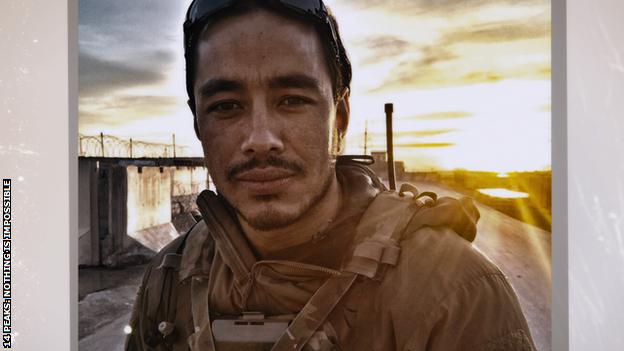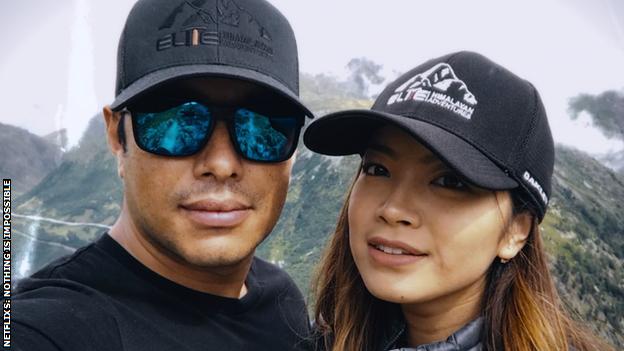Nimsdai Purja: The man who climbed the world's 14 highest mountains in seven months
Last updated on .From the section Sport

When Nepalese climber Nimsdai Purja was told scaling the world's 14 highest mountains in less than seven months couldn't be done, he wouldn't have it.
To prove his point, he named the challenge 'Project Possible'. And then did it.
In a new film, the 38-year-old former Gurkha and UK Special Forces soldier tells the story of a feat which, if not impossible, is certainly unfeasible.
"Nothing is impossible," Purja tells us. "There's no excuse."
But let's go back to the start. What did the challenge entail?
Put simply, Purja had to climb all 14 of the world's mountains that reach above 8,000m - an oxygen-starved altitude at which mountaineers enter what is called 'the death zone'.
The first person to achieve the feat was Reinhold Messner, who climbed his first in 1970 and 14th in 1986. Before Purja and his team set off in 2019, the previous speed record was just under eight years.
So why did he set himself such a mammoth challenge?
Partly to prove a point, it seems, but also - as he mentions a lot in the film - to bring more recognition to the Nepalese climbing community, which he feels is often overlooked.
"What I have heard most of the time is 'my Sherpa helped me' and that is it," he says in the film. "That is wrong, because he has a name."
And Purja, who only became a professional climber in 2019, was supported by a team of his compatriots as he wrote another chapter in a remarkable life.
Purja spent 16 years in the military - the first 10 as a Gurkha before joining the UK Special Forces.

"I'm in the top 1% in the world in terms of fitness," he tells us, without any self-consciousness.
"In order to join the UK Special Forces, it's not a joke. You have to be so fit at sea level. Your brain has to work like 10 men as well, even at sea level. So I was able to transfer that."
It was during his time with the Special Forces that Purja developed a passion for climbing, and he set a record by completing Everest, Lhotse and Makalu all within five days.
He even nonchalantly told us he thought he could have completed the 14-peaks mission more quickly than he did.
"I knew that I could have done this project within four months," he says. "But I also knew there would be politics to sort out, so I had to factor in three months for that."
Those 'politics' included getting permission for the climbs - deep into the mission, China still hadn't approved his request to attempt Shishapangma.
There was also the issue of raising funds, but the biggest challenge was convincing his family it was a good idea.
Purja is from a poor family, and as a soldier he was the main financial contributor. Against that backdrop, becoming a professional mountaineer was a big decision.
Purja's brother was so upset with him he did not speak to him for three months, while his mother is shown in the film in bad health and worried. His wife Suchi seems supportive, or at least resigned to the idea.

How did Purja navigate all of this?
"What I said to them was: 'Look, this project will inspire so many people.' Our family's sacrifice is very little compared," he tells us.
He also tells us about his ability to compartmentalise, which must have helped him during tough moments on the climbs - and there were several.
In one scene an avalanche sends him sprawling 100 metres down. In another, a man the team find stranded dies in Purja's arms.
"In the military, I have never left anyone behind," Purja says. "I wasn't going to do that on the mountains, so I gave the guy our oxygen."
But were there ever any moments when he just wanted to give up?
"There were so many," he tells us. "At one point, I was just praying that the big avalanche would come, and then I'm done.
"But then I had the bigger belief. I'd say to myself: 'You said you're going to represent the Special Forces, the Gurkhas. You said you're the hope of someone who has nothing.'
"All those motivating factors gave me energy."
Purja and the team also find time for big parties between climbs - indeed they scale Kangchenjunga in one day while hungover.
But what does he hope we take from the film?
"It's not about mountain climbing, it's about following your goals," he says.
"It's something that you could refer to when you want to push your own boundaries. People will look back on this film like Rocky."
- 14 Peaks: Nothing is Impossible is streaming on Netflix now

- Is there an ideal post-Covid diet? Find out how what you eat can help aid recovery
- When Ruby Wax met Donald Trump: She reflects on a tense and uncomfortable encounter with the former president



